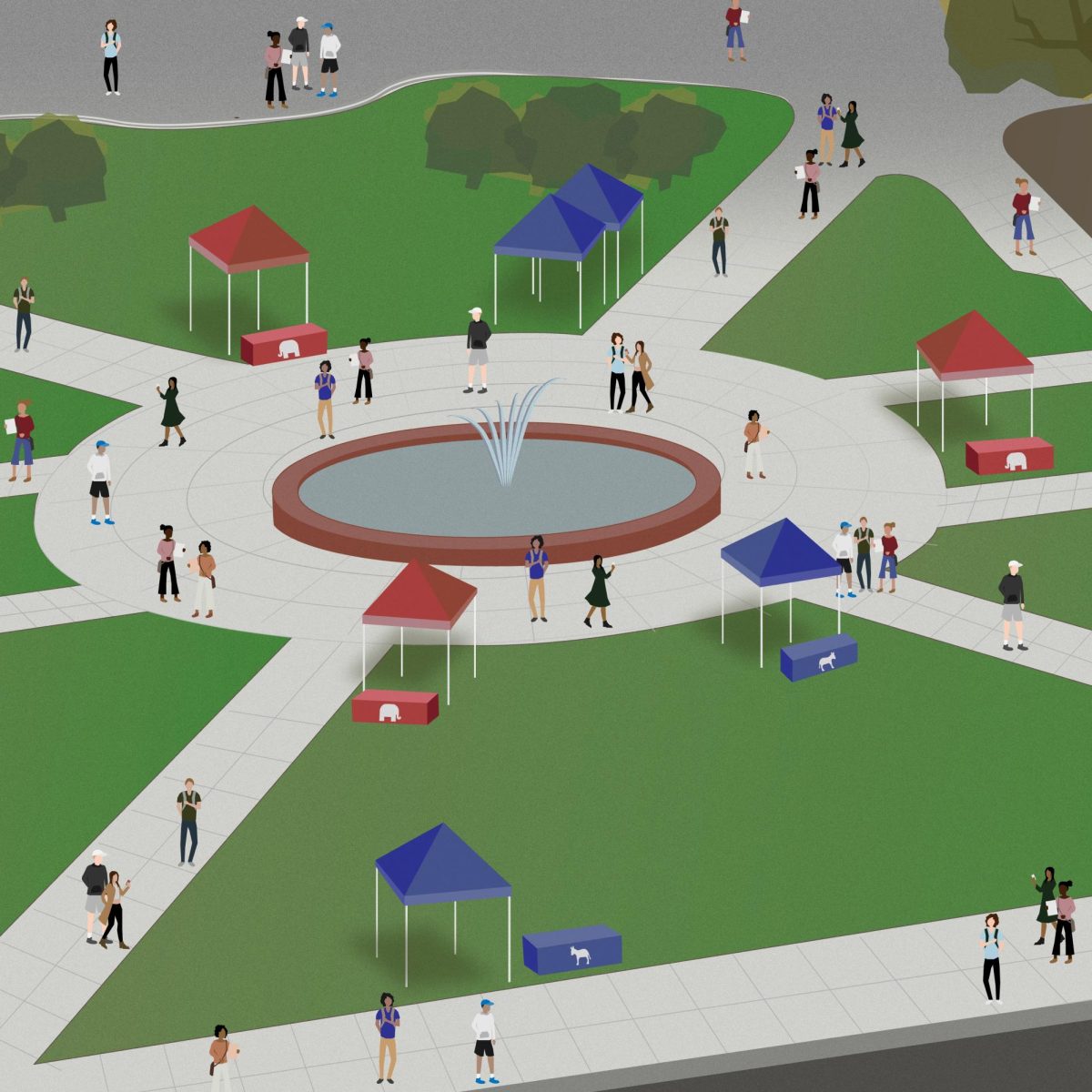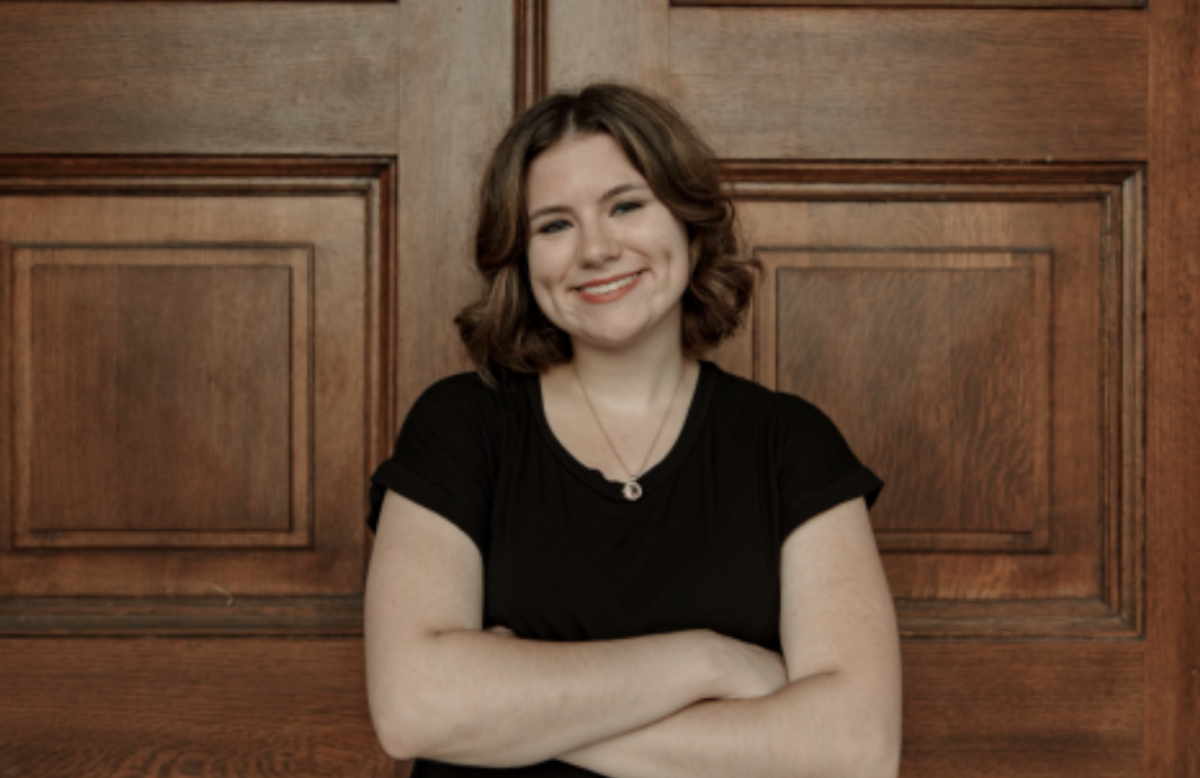As dawn breaks on a July morning, eager Badger fans swarm any device possible — laptops, iPads and cell phones, vying for the competitive prize of a coveted season student football ticket. For students at the University of Wisconsin, securing a seat at a Badgers football game can feel like winning the lottery — because it is.
It’s not just football either — whether it’s the roar of Camp Randall during football season, the intensity of the Kohl Center for basketball or the electric energy of a packed volleyball game in the Field House, these events are almost always sold out — and the fear of missing out is even higher. Behind these events lies a lottery system and a ticket economy constructed by third-party apps and message boards. With some students left looking to buy a ticket to the big game, others are looking to resell, taking advantage of a lucrative ticket market.
The initial sale
Student tickets are initially sold through UW Athletics, directly to students. To manage demand, Wisconsin employs a lottery-style system for distributing student tickets for most high-profile sports — football, men’s basketball and men’s hockey. Under this system, students enter a virtual waiting room when tickets go on sale, and from there securing a season ticket boils down to luck. If students make it through the virtual queue, they get put through to the purchase page — where they finally have the opportunity to pay $219.50 for season tickets to seven home football games.
Patrick Herb, UW Assistant Athletic Director of Strategic Communications, shared how the system functions to optimize the student buying experience.
“The number of student tickets sold at Camp Randall Stadium for football and the Kohl Center for men’s basketball was determined by the UW-Madison Athletic Board more than 25 years ago,” Herb stated. “We are grateful for the incredible passion and interest of our student body, but unfortunately, we simply do not have enough inventory to match the high demand for student tickets across [Basketball and Football] each year.”
Camp Randall’s capacity is 80,321 fans, of which only 14,000 of those are delegated to students. Students sit on the North end of the stadium, in sections J through P. Dedicated seats for students at the Kohl Center are in even shorter supply — 2,100 seats out of the total capacity of 17,230.
Tickets for Badger Football and Basketball regularly go on sale at 7:30 a.m., when students access the queue and then can be pushed through to the ticket purchasing portal.
“We do our best to schedule the on-sale timing early in the morning to avoid as many conflicts as possible,” Herb said.
So far in the 2024 season, UW has generated $23 million in revenue from football ticket sales. Additionally, the new alcohol sales at Camp Randall for the first three football games brought in just over $1.2 million, according to records obtained by The Badger Herald.
Student testimonials
Ellie Culver, a senior at UW, shared her experience with buying tickets through third parties. She missed out on getting student season tickets during the initial sale, forcing Culver to turn to third-party platforms for availability. Searching for tickets to one of the most anticipated matches of the season against Alabama, Culver quickly discovered the challenge and risk associated with buying tickets on the resale market.
“For football, my first choice is Facebook, but people always seem to highball it on Facebook,” Culver said.
She shared that message boards, like the one on Facebook, are one of the primary methods of communication between buyers and sellers. The UW Badger Student Ticket Exchange on Facebook has approximately 73,000 members.
Listings consist of “Selling [Event] message me” and students will strike a deal through direct messages, often Messenger. From there, it’s up to students to independently verify the credibility of the buyer or seller and make sure both parties receive either the money or the ticket. Money is often exchanged between peer-to-peer platforms such as Cash App or Venmo. There is no promise of security with these transactions.
Similarly, other platforms are also utilized. Other students pointed Ellie to a GroupMe chat named “KK Waffle Gallery.” The chat operates by members listing certain tickets they are attempting to buy or sell, and then members respond to one another to complete the transaction.
“I saw someone was selling a ticket for $100 so I direct messaged her. I was like, ‘Hey, I see you’re selling’ and then she asked if we could do Apple Pay,” Ellie said. “And I said, ‘I don’t have Apple Pay. Can we do Venmo?’ She said, ‘Sure.’”
Ellie never got the ticket, and she never saw her $100 again.
“I have nobody to blame but myself,” she said.
Ellie’s experience does not happen in a vacuum, there are plenty of scammers fishing on these unregulated boards hoping to dupe students into sending money to them. These scammers often impersonate other students to make prospective buyers believe they have a valid ticket. The goal is to get payment on a peer-to-peer service then quickly disappear.
“So then I went back in the group chat, and I was like, don’t buy from [Name of scammer]. She’s gonna scam you,” Ellie said. “And then she changed her name in the GroupMe, and just kept, kept going, selling Alabama for $100.”
Ellie went on to say this experience is not uncommon.
“One girl got scammed $270 and I’m kind of just like, why do we have to be like that?” she said.
Another platform where students regularly sell tickets is the Snapchat Class Story. Any current student at UW can use their Wisconsin email for verification and then can add anything to the story that all followers see. Business is direct — students can simply post the words “selling Oregon,” or “looking to buy Minnesota” and students can then direct message over Snapchat to complete the transaction.
“I know a lot of people have moved to the route of meeting up in person to do it. So it’s like, you can see that they have the ticket, and they can see that you’re gonna send the Venmo,” Ellie added.
It’s important to note that no matter the platform, every student ticket must be transferred through the UW Badgers app, which is managed by UW Athletics. Students share tickets by using the “Send Ticket” feature, which is sent through a phone number.
Third-party platforms: A new solution?
A new player in the ticket space, Student Seats is a platform where buyers and sellers can find ticket prices and be assured everyone is verified in the transaction.
Chief Marketing Officer Charlie Pietz shared how the platform fills a void with reliability and security.
“Both parties need to confirm that they have received the ticket, or they have sent the ticket, which is another layer of security, and then the ticket is held in escrow until we can confirm from both parties that it’s been sent over, and of course that there are no scams,” Pietz said.
The platform functions as an escrow service, meaning the money is transferred through Student Seats while the ticket is exchanged through the UW Badger app. The app has an in-depth verification process which includes your school email and social security number. The platform says since both parties know exactly who they are dealing with, the opportunity for scams is greatly reduced. Additionally, the platform allows for price transparency as buyers can see what tickets have been listed for and the average ticket price.
Student Seats does take a commission — sellers do not incur fees when selling their tickets on Student Seats, but the buyer incurs them based on what it was sold for. The higher the price of the ticket, the higher the percentage and flat rate fees are. For example, a transaction between $100 and $250 will have a 15% fee plus a flat rate fee of $10.
Sarah, a UW student who wishes to remain anonymous, and her friend Emma, also using a pseudonym, shared their frustrations about the growing challenges of securing student tickets. They wanted to retain anonymity due to ticket policies and the nature of their transaction — Their experience happened on Student Seats.
Sarah was looking to sell her Alabama student section ticket, so she listed it for $140. Wisconsin State Statute 42.07(2) states that selling any ticketed event above face value is a crime in Wisconsin, and when purchasing tickets through UW students agree to a policy to abide by this rule.
Furthermore, UW Athletics states, “The University of Wisconsin Athletic Department prohibits ticket purchases by account holders who are purchasing with the primary intent of reselling their tickets. If your account is identified as one with the primary intent to resell, the tickets on your account will be removed and your account will be canceled.”
Student Seats connected Sarah with a buyer, also a UW student, who first had to prove their intent to buy by sending money into the platform’s escrow system. But, things went wrong in the transfer process and the buyer took advantage of Sarah. She sent the ticket to the buyer on the UW Badger app, but before she could tell Student Seats she did, the buyer claimed he did not receive a ticket and took the money back — leaving Sarah with no money and no ticket.
“He snatched the money. [It took] five minutes, five minutes [sic],” Sarah stated. “So, like, if you didn’t click that button [to confirm] that I sent the ticket in five minutes, he was able to take [the money] back.”
Sarah and Emma worked to recover their money by contacting the buyer since they are both UW students and their identities are known they were able to track down a few parties that could help. However, the exchange escalated.
“And then the last text [the scammer] sent me when I blocked him is, ‘Don’t contact me or my family again if you care about your safety,’” Sarah said.
Student Seats has policies in place to prevent exchanges like this and ways so sellers never have to deal with losing their money.
“We have almost 50,000 users, so there’s going to be instances like that,” Pietz said. “We do have a 24/7 customer support system…We don’t get a ton, but we are answering those [incidents] as soon as possible and trying to fix things. And we do offer refunds as well. So, if students do ever, like, there’s a weird scenario like that, we make sure that they’re not getting screwed over. So that’s our number one priority. We don’t want students to think of us in a bad way. We’re just a ticket provider that allows students to connect with one another.”
Calls for reform and a role for UW
As the gap between limited availability and increasing demand for student tickets continues to widen, market risks and realities will continue to impact the fan experience. Sarah shared how she felt about the exchange and her feelings about attending future games.
“I don’t think that this has deterred me from wanting to go to the games at all, by any means, but it definitely has deterred me from wanting to sell my ticket in the future,” Sarah stated. “So I guess maybe that’s better for [UW Athletics] because I’m actually probably going to go to the rest of them now.”
Pietz shared how Student Seats wants to continue to be a reliable and helpful resource for students navigating a ticket landscape otherwise ripe with scammers and fraud.
“We aren’t like a massive ticket company such as Ticketmaster, SeatGeek, etc. that are destroying the industry,” Pietz stated. “None of us do this as a full-time job and just work on it at night when we have free time. We operate as a small business with eight total people with half of them being in college.”
Culver suggested that reform to the UW Athletics system would offer a better solution to the problem.
“I think a [individual] game ticket lottery would be a better approach,” Culver said. “That way, the tickets would go to genuine fans who want to attend the games, rather than scalpers looking to profit.”
Demand for tickets shows no signs of letting up, while 3rd party platforms attempt to fill a void in the market. Either way, there will still be students looking to buy tickets for the big game while there are also students and other entities looking for financial gain.
“I just think that there is a way better process at the university can implement,” Sarah said. “I don’t know how they would do it, but making sure students aren’t price scalping them for a higher price. Because I feel like it just depends on [a] per game [basis]. Obviously, Alabama was a huge game, and then last year was Ohio State. It’s very dependent on who’s coming here.”
Emma followed up with how the ticket economy encourages secondary scalping.
“It’s really scary how most people that get the tickets and then they sell their entire student pass literally a minute after, for like, $1,000 — that’s bad,” Emma replied.
Emma suggested the tickets should only be transferable to the university and the students, thus eliminating an unregulated 3rd party market.
“[UW] should only let you sell it back to the university for the price you bought it, like each ticket is $38 or whatever [sic],” Emma said. “You take the whole pass, and you divide by how many games that tickets are, you’d only be able to sell it back, through the university for that $38 or whatever, and then the university sells it to a different student for $38.”
Culver stressed her advice for students looking to score tickets.
“I would first ask literally every trusted source you know. Do you have any tickets? Does anyone you know have any tickets? Because then you know it’s reliable,” she said.








